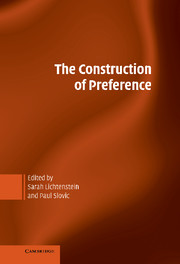Book contents
- Frontmatter
- Contents
- Contributors
- Preface
- Acknowledgments
- I INTRODUCTION
- II PREFERENCE REVERSALS
- III PSYCHOLOGICAL THEORIES OF PREFERENCE REVERSALS
- IV EVIDENCE FOR PREFERENCE CONSTRUCTION
- V THEORIES OF PREFERENCE CONSTRUCTION
- 17 Constructive Consumer Choice Processes
- 18 Decision Making and Action: The Search for a Dominance Structure
- 19 Pre- and Post-Decision Construction of Preferences: Differentiation and Consolidation
- 20 Choice Bracketing
- 21 Constructing Preferences From Memory
- VI AFFECT AND REASON
- VII MISWANTING
- VIII CONTINGENT VALUATION
- IX PREFERENCE MANAGEMENT
- References
- Index
20 - Choice Bracketing
Published online by Cambridge University Press: 05 June 2012
- Frontmatter
- Contents
- Contributors
- Preface
- Acknowledgments
- I INTRODUCTION
- II PREFERENCE REVERSALS
- III PSYCHOLOGICAL THEORIES OF PREFERENCE REVERSALS
- IV EVIDENCE FOR PREFERENCE CONSTRUCTION
- V THEORIES OF PREFERENCE CONSTRUCTION
- 17 Constructive Consumer Choice Processes
- 18 Decision Making and Action: The Search for a Dominance Structure
- 19 Pre- and Post-Decision Construction of Preferences: Differentiation and Consolidation
- 20 Choice Bracketing
- 21 Constructing Preferences From Memory
- VI AFFECT AND REASON
- VII MISWANTING
- VIII CONTINGENT VALUATION
- IX PREFERENCE MANAGEMENT
- References
- Index
Summary
If we do not accustom ourselves to look upon war, and the single campaigns in a war, as a chain which is all composed of battles strung together, one of which always brings on another; if we adopt the idea that the taking of a certain geographical point, the occupation of an undefended province, is in itself anything; then we are very likely to regard it as an acquisition which we may retain; and if we look at it so, and not as a term in the whole series of events, we do not ask ourselves whether this possession may not lead to greater disadvantages hereafter.
von Clausewitz, On War (1832/1992)INTRODUCTION
The consequences of choices can rarely be fully appreciated in isolation. Even seemingly trivial decisions, such as whether or not to indulge in dessert, save small amounts of money, or purchase lottery tickets, can have profound cumulative effects on our physical and material well-being. When we make choices without considering these effects, we can do to ourselves what the bad general can do to his army – make a series of local choices that each appear to be advantageous but which collectively lead to a bad global outcome.
In this chapter we introduce the concept of choice bracketing, a term that designates the grouping of individual choices together into sets.
- Type
- Chapter
- Information
- The Construction of Preference , pp. 372 - 396Publisher: Cambridge University PressPrint publication year: 2006
- 1
- Cited by



